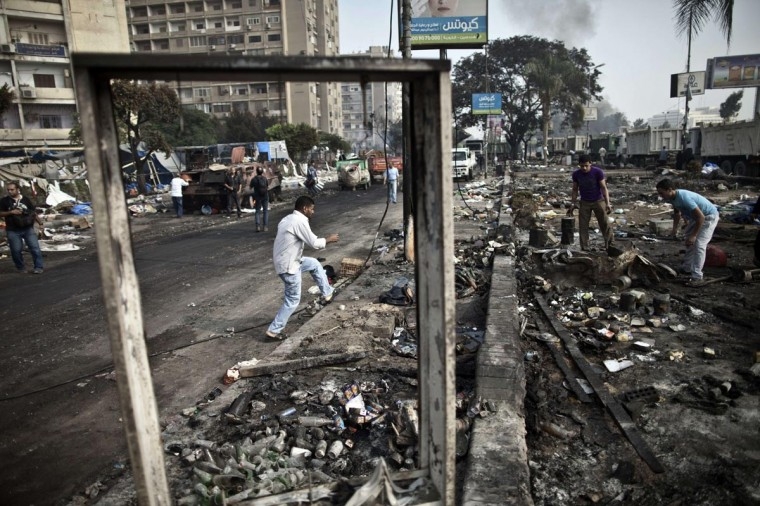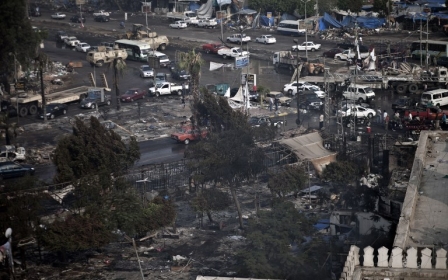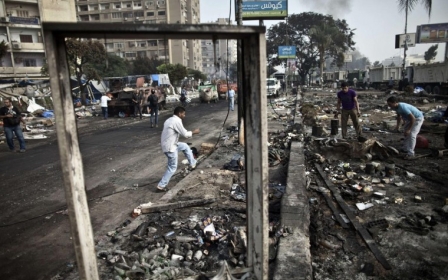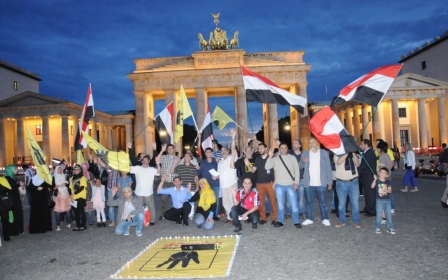The Rabaa massacre and Egyptian propaganda

In contemporary Egypt, an elimination campaign has been ongoing since Egypt’s July 2013 military coup, which overthrew the nation’s first-ever freely elected president, Mohamed Morsi, who hails from the Muslim Brotherhood. For more than two years, Egypt’s military-backed government has been engaged in a comprehensive campaign to eradicate the Muslim Brotherhood and their supporters from public life.
The eliminationist policy has included mass arrests, mass trials, mass death sentences, various laws banning political parties and charitable organisations associated with the Brotherhood, and the shutting down of all Brotherhood-affiliated television networks. Importantly, the campaign to eliminate the Brotherhood, which won five consecutive free-and-fair elections during Egypt’s brief 2011-2012 democratic transition, has also included mass killings.
Today marks the two-year anniversary of the Rabaa Square massacre, during which - according to a year-long investigation by Human Rights Watch (HRW) - Egyptian security forces killed at least 817 Muslim Brotherhood members, supporters and sympathisers in broad daylight. Egyptian security forces burned evidence, including dead bodies, and forced Egyptian families to accept death certificates saying that their loved ones had died of “natural causes”. The Egyptian police and army also massacred pro-Brotherhood protesters on several other occasions in July and August 2013, including at least 51 people in front of the Presidential Guard building on 8 July 2013, at least 87 others in Nahda Square on 14 August 2013, and at least 95 others at the Manassa in Nasr City on 27 July 2013.
According to HRW, nearly all of the protesters at Rabaa, Nahda, Presidential Guard, Manassa and other locations were unarmed and “overwhelmingly peaceful”. Evidence gathered suggests that Egyptian security forces may have been “shooting to kill,” rather than aiming to apprehend or injure, large numbers of protesters, and that dispersal policies were authorised at the “highest levels” of the Egyptian government.
All of Egypt’s state institutions have been commandeered to support the most blatant campaign of repression in the nation’s modern history. The military and police have carried out the bulk of the violence, while the religious and media apparatuses have offered critical ideological support. Mainstream Egyptian religious and media personalities, have, in particular, been instrumental. Their propaganda has exaggerated the number of police officer casualties, hailed the security forces as heroes, and - most notably - justified and, in some cases, celebrated the deaths of Muslim Brotherhood members, supporters and sympathisers.
Religious propaganda
As I’ve documented elsewhere, Muslim and Christian religious authorities have provided critical support for the campaign to eliminate the Brotherhood. For example, a prominent pro-military imam, Mazhar Shaheen, used his nationally televised programme to call for publicly crucifying members of the Brotherhood. Immediately after one of the larger massacres in Cairo, the Coptic Christian Pope tweeted his thanks to the “Glorious Egyptian army” and “Magnificent Egyptian police force” for “opening the doors of hope” to Egyptians.
In lectures and interviews, prominent Muslim scholar Ali Gumah has repeatedly referred to the police as “heroes” and the Muslim Brotherhood as both “dogs of the hellfire” and “kharijites”. His consistent reference to “kharijtes” is significant. The kharijites were a heretical, premodern Muslim sect, and Egyptian regimes have often invoked the comparison in reference to religious opposition, whether radical or not.
These statements from Gumah, who is Egypt’s former grand mufti, come in the context of his words, directed to police, suggesting that members of the security forces are on the “path of God” and that they should not feel remorseful about killing criminals in the streets. Gumah has also used his nationally televised programme to put his religious stamp of approval on mass death sentences and executions that have been widely condemned by human rights groups.
In recent television interviews, Gumah has also claimed that the Brotherhood’s four-fingered Rabaa sign is a “masonic symbol,” and that Adolf Hitler personally organised the Brotherhood’s “special unit”.
The government of current President Abdel Fattah al-Sisi has taken measures to control the nation’s religious discourse. They have shut down thousands of mosques, arrested religious leaders seen as sympathetic to the Brotherhood, and instituted policies dictating the exact time and topic of Friday sermons, among other measures. Religious leaders have fallen in line. Azharite scholar Saad al-Din al-Hilali claimed that Sisi is a messenger of God, while another scholar used a Friday sermon to document a Sisi-related miracle. Most recently, Sheikh Sabry Ebada, a religious scholar and representative of the Ministry of Endowment, said in a nationally televised interview that whoever supports anti-Sisi protests “is sinful and has left the religion of Islam”.
Media propaganda
The Egyptian media’s anti-Brotherhood propaganda campaign began before the 3 July 2013 military coup and has been intensified since. Undoubtedly taking their cue from political leaders speaking earnestly of “cleansing” the country of impure elements, mainstream satellite news networks, both state-owned and private, as well as daily and weekly newspapers, staunchly supported the military and police right through their worst human rights atrocities, often employing hyper-nationalist, pro-military rhetoric. Media regularly described the police and military as heroes and symbols of the nation, while consistently dehumanising the Brotherhood. Egyptian media casually referred to the Brotherhood as un-Egyptian, treasonous, terrorists, and equated them to insects and animals.
Numerous conspiracy theories were amplified by Egyptian media, including some that blamed the Brotherhood for acts of violence they couldn’t have committed, and others that accused the Brotherhood of attempting to lease the Great Pyramids of Giza and the Suez Canal to foreign enemies. The daily newspaper al-Wafd accused the Brotherhood of teaming up with the Knights of Malta to kill Egyptians in 2011, and television presenter Mohamed al-Ghetey claimed that the Brotherhood, founded in the 1920s, was the reason for the fall of Muslim Spain in the 15th century.
Much media coverage has been devoted to explicitly supporting draconian government policies, including mass arrests, torture, extra-legal killings and mass death sentences, with presenters and guests often suggesting that Egypt’s current government is being too lenient on the Brotherhood and their supporters and sympathisers. On a nationally televised programme, a law professor advocated “intensifying capital punishment” by burning the bodies of deceased Brotherhood members after they are executed by the state.
In a passionate interview with prominent television presenter Ahmed Mousa on satellite network Sada al-Balad, musical artist Hani Shaker said he wants criminals to be killed immediately without arrest, investigation or trial. He explained that this is how things are done in democratic countries like the United States. Shaker said: “The one who steals a pack of cigarettes from the mall in America, they kill him.” He also said: “There should not be any investigations [in Egypt]. No investigations.”
Mousa, the television presenter, said: “I don’t want law. I don’t want to hear the word law. We are a country that is not going to follow the rule of law. We are not going to work within the law.”
Shaker added: “A firm stance needs to be taken against any Muslim Brother, whether he has committed a crime or not.”
Importantly, much of Egypt’s post-July 2013 media and popular discourse has focused on conspiracy theories related to the Brotherhood’s alleged close ties to the United States, Israel, Turkey and Qatar. A top Egyptian law professor claimed that the Brotherhood was working as agents of Israel and the United States; a prominent writer claimed the Brotherhood was implementing the “Protocols of the Elders of Zion”; al-Wafd newspaper claimed in a front-page headline that US President Barack Obama is an active member of the Muslim Brotherhood; and the Vice President of Egypt’s High Constitutional Court stated on national television that Obama’s brother finances the Brotherhood’s global project. After American Mohamed Soltan was finally released from an Egyptian prison and deported to the United States, an Egyptian anchor responded by saying, “God willing, you will become paralysed.”
Coverage of the Rabaa massacre
Egyptian media covered the Rabaa massacre in ways consistent with the government line. Media coverage portrayed the police as heroes and victims, and the Brotherhood and their supporters as aggressors. Egyptian coverage stands in stark contrast to both detailed human rights reports and Western media coverage of the massacre. Egyptian media have consistently accused both Western media and human rights groups of bowing to the Brotherhood, and, in some cases, of colluding with the Islamist movement.
Coverage of the Rabaa massacre on popular television networks OnTv and Fareen was particularly unsympathetic to the Brotherhood. OnTv showed footage of police officers dispersing Rabaa Square while playing the soundtrack for the movie Rocky. Not to be outdone, Faraeen played footage of the dispersal against the backdrop of music from Pirates of the Caribbean.
As part of a separate research project, I watched 14 August 2013 coverage of flagship programmes on both the al-Nahar and CBC networks. The host of al-Nahar's flagship news programme, Akher al-Nahar, said the government had been too lenient with the Muslim Brotherhood and that police should have dispersed their protests earlier. She also suggested that the Brotherhood is an agent of the United States, Qatar, Turkey and Israel, and that the group had killed dozens of innocent people and stored the bodies under the Rabaa Square stage.
The New York Times' David Kirkpatrick debunked the body-storing rumour, which was reported widely in Egyptian media. Guests on Akher al-Nahar praised the police for exercising “self-control,” cursed Mohamed el-Baradei for resigning his government post in protest against the violent dispersal, spoke of the “foreign conspiracy against Egypt,” and argued that Brotherhood members should be completely removed from politics and tried for “high treason”.
The CBC Network's 14 August 2013 broadcast referred to slain police officers as “martyrs” and complained that the Brotherhood was using women and children as “human shields”. Anchor Dina Abdelrahman also seemed to suggest that true Egyptian citizens had rejected the Brotherhood, who, she implied, are not truly Egyptian. She said: “There are not two groups [in Egypt]. There is the Egyptian nation [on one side] and there is a group of Muslim Brothers [on the other side].” Consistent with her rhetoric, one of her guests argued that the Brotherhood’s governance of Egypt constituted a “foreign occupation” of the country. Another guest praised the police for performing “better than excellent” and discussed the alleged Brotherhood-Turkish-American plot against Egypt. The CBC downplayed the deaths of pro-Brotherhood protesters and focused inordinately on the comparatively few police officer deaths.
Popular support
Opinion polling data from Pew and Zogby Research Services suggests that Egypt is a deeply divided society, with roughly half of Egyptians supporting the 2013 military takeover and half opposing. Out of the roughly half of Egyptians who do support the new political order, at least some are on board with the government’s eliminationist policy.
Journalist Max Blumenthal documented dozens of tweets by Egyptians supporting the security forces, justifying state-sponsored violence, and blaming the Muslim Brotherhood for the deaths of their own members and supporters. One tweet read: “What massacre are you talking about? These are armed terrorists who mutilate innocent ppl. They shoot their own in the back.” Another read: “a good opponent is a dead opponent.” Several tweets accused the Brotherhood of using women and children as human shields.
In the aftermath of the massacres, a Facebook page for artist Amr Mustafa posted the following: “Whomever hates the terrorist Brotherhood and wants their mass execution without trial, [press] like.” More than 8,000 ordinary Egyptians ‘liked’ the post, with more than a hundred commenting in support. One comment read, “May God get rid of them for us.” Another read, “The best solution is immediate execution.” Another read, “A billion likes [for this post] and may God take them all.”
In his book, Hitler’s Willing Executioners: Ordinary Germans and the Holocaust, scholar Daniel Goldhagen suggests that many ordinary Germans supported Hitler’s campaign of eliminationism against Jews. Goldhagen argues that the Nazi government’s characterisation of Jews was “shared by elites and, more importantly, by the common people” (page 30). Given the numerous calls to violence by ordinary Egyptian citizens on Egyptian television call-in shows, street interviews, news sites, and social media networks, it may well be time for scholars to ask how much of Egypt’s populace has bought into the government’s eliminationist rhetoric.
New MEE newsletter: Jerusalem Dispatch
Sign up to get the latest insights and analysis on Israel-Palestine, alongside Turkey Unpacked and other MEE newsletters
Middle East Eye delivers independent and unrivalled coverage and analysis of the Middle East, North Africa and beyond. To learn more about republishing this content and the associated fees, please fill out this form. More about MEE can be found here.





